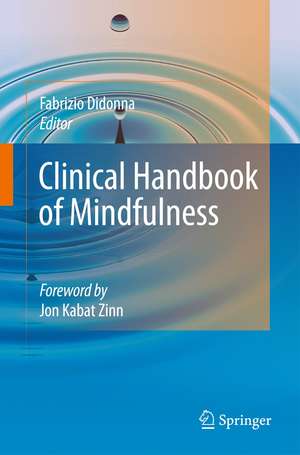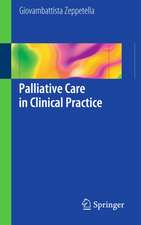Clinical Handbook of Mindfulness
Editat de Fabrizio Didonnaen Limba Engleză Paperback – 5 oct 2010
The Clinical Handbook of Mindfulness is a clearly written, theory-to-practice guide to this powerful therapeutic approach (and related concepts in meditation, acceptance, and compassion) and its potential for treating a range of frequently encountered psychological problems.
Key features of the Handbook:
- A neurobiological review of how mindfulness works.
- Strategies for engaging patients in practicing mindfulness.
- Tools and techniques for assessing mindfulness.
- Interventions for high-profile conditions, including depression, anxiety, trauma
- Special chapters on using mindfulness in oncology and chronic pain.
- Interventions specific to children and elders,
- Unique applications to inpatient settings.
- Issues in professional training.
- Appendix of exercises.
| Toate formatele și edițiile | Preț | Express |
|---|---|---|
| Paperback (1) | 1614.47 lei 6-8 săpt. | |
| Springer – 5 oct 2010 | 1614.47 lei 6-8 săpt. | |
| Hardback (1) | 1623.43 lei 6-8 săpt. | |
| Springer – 10 noi 2008 | 1623.43 lei 6-8 săpt. |
Preț: 1614.47 lei
Preț vechi: 1699.45 lei
-5% Nou
Puncte Express: 2422
Preț estimativ în valută:
308.97€ • 321.38$ • 255.07£
308.97€ • 321.38$ • 255.07£
Carte tipărită la comandă
Livrare economică 12-26 aprilie
Preluare comenzi: 021 569.72.76
Specificații
ISBN-13: 9781441918680
ISBN-10: 144191868X
Pagini: 560
Ilustrații: XXXIII, 523 p.
Dimensiuni: 178 x 254 x 29 mm
Greutate: 0.96 kg
Ediția:Softcover reprint of hardcover 1st ed. 2009
Editura: Springer
Colecția Springer
Locul publicării:New York, NY, United States
ISBN-10: 144191868X
Pagini: 560
Ilustrații: XXXIII, 523 p.
Dimensiuni: 178 x 254 x 29 mm
Greutate: 0.96 kg
Ediția:Softcover reprint of hardcover 1st ed. 2009
Editura: Springer
Colecția Springer
Locul publicării:New York, NY, United States
Public țintă
Professional/practitionerDescriere
Over the last two decades, Eastern psychology has provided fertile ground for therapists, as a cornerstone, a component, or an adjunct of their work. In particular, research studies are identifying the Buddhist practice of mindfulness—a non-judgmental self-observation that promotes personal awareness—as a basis for effective interventions for a variety of disorders.
The Clinical Handbook of Mindfulness is a clearly written, theory-to-practice guide to this powerful therapeutic approach (and related concepts in meditation, acceptance, and compassion) and its potential for treating a range of frequently encountered psychological problems.
Key features of the Handbook:
The Clinical Handbook of Mindfulness is a clearly written, theory-to-practice guide to this powerful therapeutic approach (and related concepts in meditation, acceptance, and compassion) and its potential for treating a range of frequently encountered psychological problems.
Key features of the Handbook:
- A neurobiological review of how mindfulness works.
- Strategies for engaging patients in practicing mindfulness.
- Tools and techniques for assessing mindfulness.
- Interventions for high-profile conditions, including depression, anxiety, trauma
- Special chapters on using mindfulness in oncology and chronic pain.
- Interventions specific to children and elders,
- Unique applications to inpatient settings.
- Issues in professional training.
- Appendix of exercises.
Cuprins
Introduction. Where new and old paths to dealing with suffering meet.-Part 1: Theory, Conceptualization and Phenomenology. 1. Mindfulness: What is it? Where did it come from? 2. Mindfulness and Meditation. 3. The Neurobiology of Mindfulness. 4. Phenomenology and emotional correlates of mindfulness.-Part 2: Clinical applications: General issues, Rationale and Phenomenology. 5. Mindfulness and Psychopatology. 6. Mindfulness, compassion and emotional memory. 7. The Use of Metaphor to Establish Acceptance and Mindfulness. 8. Mindfulness and feeling of emptiness in psychopathology. 9. Assessment of Mindfulness.-Part 3: Mindfulness-Based Interventions for Specific Disorders. 10. Mindfulness and Anxiety Disorders: Developing a wise relationship with the inner experience of fear. 11. Mindfulness and Obsessive-Compulsive Disorder. 12. Mindfulness-Based Cognitive Therapy for Depression and Suicidality. 13. Mindfulness and Borderline Personality Disorder. 14. Mindfulness and Eating Disorders. 15. Mindfulness and Addictive Behavior. 16. Mindfulness for Trauma and Post Traumatic Stress Disorder. 17. Mindfulness for Attention Deficit Hyperactivity Disorder (ADHD). 18. Mindfulness and Psychosis. 19. Mindfulness and Chronic pain. 20. Mindfulness-Based Interventions in oncology.-Part 4: Mindfulness-Based Interventions for Specific Settings and Populations. 21. Mindfulness-based interventions in an individual clinical setting. 22. Mindfulness with children. 23. Mindfulness-Based Elder Care: Communicating mindfulness to frail elders and their caregivers.- 24. Mindfulness-based interventions in an inpatient setting. 25. Training Professionals in Mindfulness: The Heart of Teaching.-Appendix A: The practice of mindfulness.
Recenzii
From the reviews: "This book addresses the theory and clinical applications of mindfulness. … In addition to clinicians, researchers, and scholars in psychology, psychiatry, and the social sciences who wish to more thoroughly understand mindfulness and its clinical applications, the editor intends the handbook as a reference for university students and trainees in psychology, psychiatry, social work, psychiatric nursing, and counseling. … This book should be in the library of both those who are interested in learning about mindfulness and those who are faithful practitioners." Gary B. Kaniuk, Doody’s Review Service, November, 2009 "In twenty years, this book might, as most handbooks do, take on a new role as an historical object in its own right, a marker of a creative moment in the history of an emerging field, still in its infancy..." From the foreword by Jon kabat-Zinn "This book draws together a wide range of psychological interventions that incorporate mindfulness-based practices within psychological approaches to treating mental disorders. Such a large number of positions and contribution is rare and, thus, very hard to find. This book will serve as a reference text for anyone wanting to stay up to date on the applications of mindfulness to clinical practice." Prof. Marsha Linehan, Professor of Psychology, University of Washington "This book is set to become a classic text. Open the book at any page and you find writing of extraordinary wisdom and precision. Its vision is comprehensive; and it allows us to see clearly how compelling it is when the art and science of wise investigation are brought together." Mark Williams, Ph.D., Professor of Clinical Psychology, University of Oxford “Clinical Handbook of Mindfulness is an outstanding volume that well represents the most current and cutting-edge research on the subject. … is written in highly accessible language and is recommended for all levels of education. It is most appropriate for someone who is looking for a broad introduction to clinical applications of mindfulness, but it will be equally useful for those who want to be part of a new wave of experiential research that is sweeping the field.” (Brent Dean Robbins, PsycCRITIQUES, Vol. 85 (8), February, 2010)
"The Clinical Handbook of Mindfulness is a welcome addition to the professional literature in psychology, psychiatry, counseling, and social work. Practicing clinicians and mental health consultants should read the book to enhance their existing knowledge of mindfulness and learn more about its therapeutic utility. The book should also be must reading for anyone interested in or conducting clinical research in the area of mindfulness. For graduate students and trainees, the book could be included in coursework and seminars devoted to therapeutic methods in clinical psychology and, in particular, cognitive behavioral therapy. I hope that the book reaches a wide audience because it is a high-quality publication worthy of widespread attention." (James K. Luiselli, May Institute, July 2010)
"The Clinical Handbook of Mindfulness is a welcome addition to the professional literature in psychology, psychiatry, counseling, and social work. Practicing clinicians and mental health consultants should read the book to enhance their existing knowledge of mindfulness and learn more about its therapeutic utility. The book should also be must reading for anyone interested in or conducting clinical research in the area of mindfulness. For graduate students and trainees, the book could be included in coursework and seminars devoted to therapeutic methods in clinical psychology and, in particular, cognitive behavioral therapy. I hope that the book reaches a wide audience because it is a high-quality publication worthy of widespread attention." (James K. Luiselli, May Institute, July 2010)
Notă biografică
Fabrizio Didonna is a Clinical Psychologist and Cognitive Behaviour Psychotherapist. He is founder and President of the Italian Institute for Mindfulness (IS.I.MIND). He is Coordinator of the Unit for Mood and Anxiety Disorders, and he also works at the Unit for Borderline Personality Disorders in the Department of Psychiatry at the Casa di Cura Villa Margherita in Vicenza, Italy. He is a teacher and trainer at the School of Cognitive Therapy in Bologna, at the School of Cognitive and Forensic Psychotherapy in Reggio Emilia and at the Institute for Cognitive Science in Grosseto, Italy. He is an experienced instructor of mindfulness groups both in inpatient and outpatient settings and was one of the first therapists who planned and used mindfulness training with patients with severe disorders in inpatient treatment programs. He has given workshops worldwide in the field of CBT for obsessive compulsive disorder, depression, anxiety disorders and mindfulness-based training, has presented scientific papers at conferences in Italy and Europe, and published many articles, several chapters and two books. He is Vice-President of the Italian Association for Obsessive-Compulsive Disorder and also the Representative of the Regional Section of SITCC, the Italian Society for Cognitive and Behaviour Therapy. He has been practicing and teaching meditation for many years and gives training retreats in MBCT and mindfulness-based interventions in Italy and in many countries in Europe.
Textul de pe ultima copertă
Over the last two decades, Eastern psychology has provided fertile ground for therapists, as a cornerstone, a component, or an adjunct of their work. In particular, research studies are identifying the Buddhist practice of mindfulness—a non-judgmental self-observation that promotes personal awareness—as a basis for effective interventions for a variety of disorders.
The Clinical Handbook of Mindfulness is a clearly written, theory-to-practice guide to this powerful therapeutic approach (and related concepts in meditation, acceptance, and compassion) and its potential for treating a range of frequently encountered psychological problems.
Key features of the Handbook:
The Clinical Handbook of Mindfulness is a clearly written, theory-to-practice guide to this powerful therapeutic approach (and related concepts in meditation, acceptance, and compassion) and its potential for treating a range of frequently encountered psychological problems.
Key features of the Handbook:
- A neurobiological review of how mindfulness works.
- Strategies for engaging patients in practicing mindfulness.
- Tools and techniques for assessing mindfulness.
- Interventions for high-profile conditions, including depression, anxiety, trauma
- Special chapters on using mindfulness in oncology and chronic pain.
- Interventions specific to children and elders,
- Unique applications to inpatient settings.
- Issues in professional training.
- Appendix of exercises.
Caracteristici
Explains the clinical mechanisms of mindfulness-based interventions for a number of disorders
Expands the range of clinical applications of mindfulness-based approaches
Links theory and practice
Highlights emerging topics in Mindfulness as well as established perspectives
Illustrates and explains the application of mindfulness in inpatient treatment
Includes supplementary material: sn.pub/extras
Expands the range of clinical applications of mindfulness-based approaches
Links theory and practice
Highlights emerging topics in Mindfulness as well as established perspectives
Illustrates and explains the application of mindfulness in inpatient treatment
Includes supplementary material: sn.pub/extras










